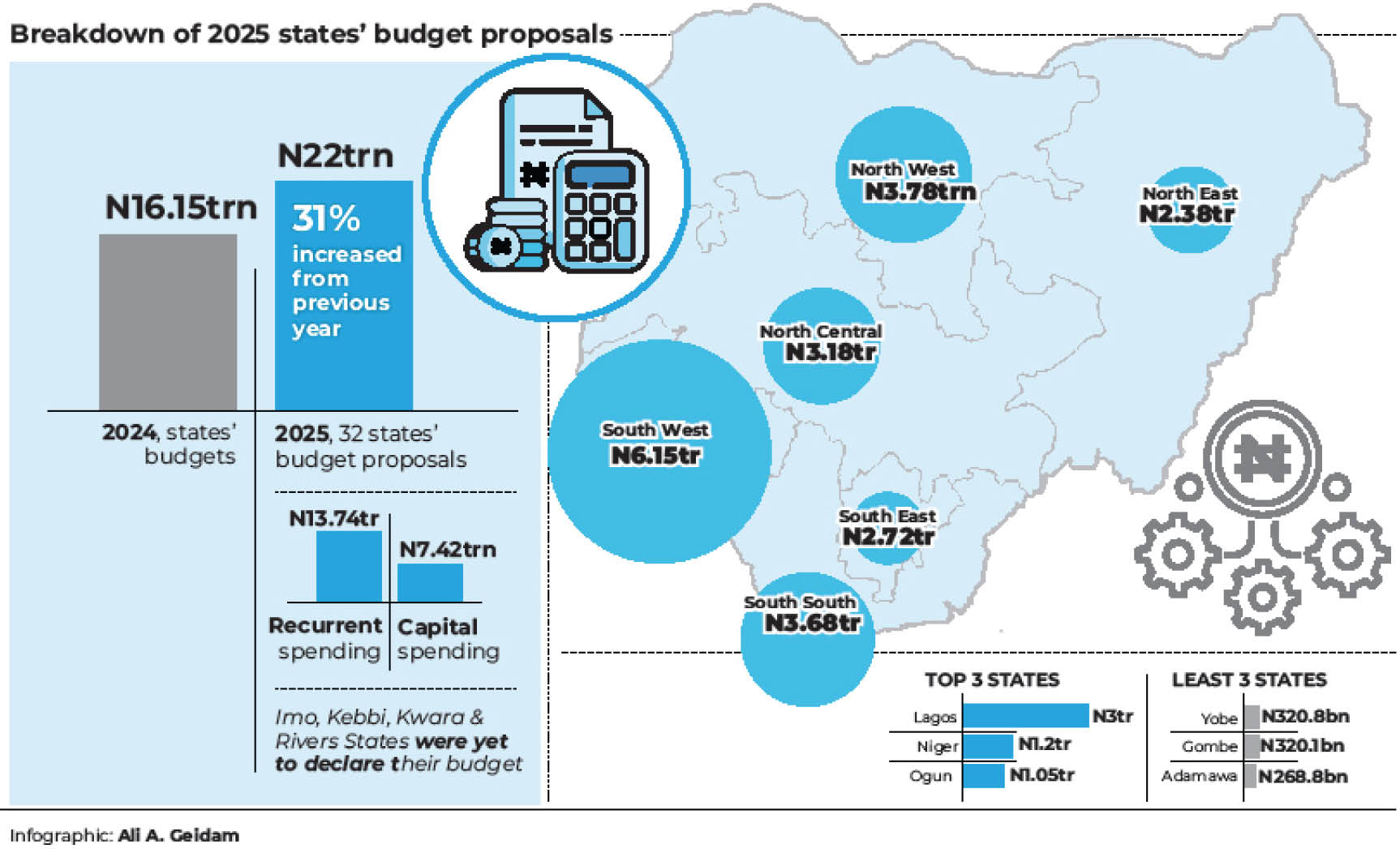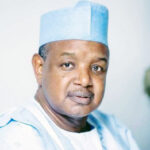Citizens have said they are expecting more developmental projects and programmes from governors following the increases in the fiscal estimates proposed for the 2025 by various state governments.
Analysis by Daily Trust showed that 32 of the 36 governors have proposed a total sum of N21.9 trillion in the appropriation bills presented to their state assemblies.
This showed that the 2025 budgets of the states are about 31 per cent higher than those of 2024 which were N16.15 trillion.
Daily Trust findings show that the governors of Imo, Kebbi, Kwara and Rivers states have not presented 2025 budgets.
- Zamfara explosions: A new terrorists’ strategy requiring gov’t attention
- Nigeria exports N181.62bn electricity in 9 months
For the 2025 fiscal proposals of other 32 states, there are a total of N14.35 trillion for capital expenditure and N7.56 trillion for recurrent.
A geo-political analysis of the budget estimates for 2025 indicated that South West had the highest (N6.15 trillion), followed by the North West (N3.78 trillion,) South South (N3.68 trillion), North Central (N3.18 trillion), South East (N2.72 trillion) and North East (N2.38 trillion).
Lagos State has the highest budget estimate of N3 trillion, with N1.76 trillion for capital expenditure and N1.23 trillion for recurrent.
Ogun State proposed N1.05 trillion budget, consisting of N600.9 billion capital expenditure and N453.56 billion for recurrent expenditure.
Others are Niger State (N1.2 trillion): N1.01 trillion for capital and N188.42bn for recurrent; Enugu State (N971 billion): N837.9 billion for capital and N133.1 billion for recurrent; Akwa Ibom State (N955 billion): N655 billion for capital and N300 billion for recurrent; Delta State (N936 billion): with N587bn capital expenditure and 348bn recurrent; Kaduna State (N790 billion): N553 billion capital and N236.6 billion.
Abia State proposed N750.282 billion out of which N611.7 billion is for capital expenditure and N138.8 billion for recurrent; Jigawa (N698.3 billion): N534.76 billion capital and N161.75 billion recurrent; Bayelsa State (N689.4 billion): N426 billion capital and N263.38 billion recurrent; Katsina State (N682 billion): N524.2 billion capital and N157.9 billion recurrent; Oyo State (N678 billion): N349.29 capital and N325.57 billion recurrent; Ondo (N655.23 billion): N406.3 billion capital and N248.92 billion recurrent; Anambra (N607 billion): N139.5 billion recurrent and N467.5 billion capital; Edo State (N605 billion): N223 billion recurrent and N381 billion capital.
Borno State proposed N584 billion budget estimates with N380.84 billion for capital expenditure and N203.92 billion for recurrent expenditure; Kogi (N582.4 billion): N302.8 billion capital and N279.6 billion recurrent; Benue (N550.1 billion): N175.4 billion recurrent and N374.7 billion capital; Kano (N549 billion): N236.5 billion capital and N312.6 billion recurrent; Zamfara (N545.01 billion): N151.6 billion recurrent and N393.3 billion capital; Sokoto (N526.8 billion): N349.4 billion capital and N176.3 billion recurrent.
Cross River State proposed N498 billion budget estimates with N328 billion for capital expenditure and N170 billion for recurrent; Plateau State (N471 billion): N269.6 billion capital and N202 billion recurrent; Bauchi (N465.855 billion): N282.3 billion capital and N183 billion recurrent; Taraba (N429.8 billion): N266.12 billion capital and N163.78 billion recurrent.
Ebonyi State proposed N396.59 billion budget estimate with N284.5 billion capital expenditure and N112 billion recurrent; Osun (N390.028 billion): N246 billion recurrent and N144 billion capital; Nasarawa (N382.57 billion): N222.6 billion capital and N159.97 billion recurrent; Ekiti (N375.79 billion): N183.5 billion recurrent and N192.3 billion capital.
Yobe, Gombe, Adamawa have lowest budget estimates
Yobe State is among the top three states with the lowest budget estimates for 2025 as it proposed N320.8 billion with N176.8 billion capital and N144 billion recurrent; followed by Gombe (N320.1 billion): N209.02 billion capital and N111.09 billion recurrent; Adamawa (N268.8 billion): N100 billion recurrent and N168.8 billion capital.
Our expectations on 2025 budgets – Citizens
Nigerians from various states, who spoke to our correspondents, shared their thoughts on the proposed budgets.
While some are hopeful that the budgets would bring much-needed improvements, others are sceptical.
Even though they mostly admitted the impact which inflation might have on the projections, they, nonetheless, called for prudence and transparency on the side of the governors to achieve the desired results.
Mustapha Isa Fagge, a civil servant in Kano, asked the government to fulfil its promises to improve the quality of infrastructure in schools.
“I personally believe that the government has what it takes to restore the lost glory of our schools. They should provide teaching kits and improve the salaries of teachers. They can do this by ruling out needless spending,” he said.
Abdulmajid Abdullahi Bako, who works with one of the hospitals in the state, said the governors have no excuse not to perform.
“Subsidy has been removed, and the governors are receiving a lot of money. When they were about to remove the subsidy, we were told it was only benefitting the rich; and that the proceeds will now be channelled towards improving the life of the poor.
“It is now approaching two years; we want to see the benefit. Our governors should justify the money they are collecting by working hard to improve our life,” he said.
Muhammad Nasiru, a retired teacher in the state, urged the government to prioritise workers and pensioners’ welfare, given the rising cost of living.
Some residents of Kaduna said they want to see the impact of the N790 billion budget estimates on security, infrastructure and education.
Alhaji Muhammadu Lawal Maikudi, asked the state government to improve the lives of citizens.
Lagos residents wanted the over N3 trillion budget estimates to have a greater focus on education and infrastructure development.
Comrade Joseph Evah, a school proprietor, said the education sector must be prioritised to address overcrowding in classrooms and other challenges.
An entrepreneur, Bukola Arubuola, urged the Lagos State government to execute road projects in order to ease traffic and create jobs for the youth.
A resident of Jos, Plateau State, Azi Peter and others, said their expectations are high, and asked the government to improve internal revenue generation, ensure funds are effectively allocated and monitor implementation of the budget to achieve tangible results.
In Bayelsa, citizens asked the state government to provide critical infrastructure, including potable water, stable electricity and better housing. David-West Beniwariy, a resident, wants the government to assess the performance of the 2024 budget before making promises for the 2025 fiscal year; while Godson Independence, a trader, urged the government to invest more in the gas turbines, given the unreliability of the national grid in the state, and provide free and affordable education.
In Akwa Ibom, Otuekong Franklyn Ison, Director, Centre for Human Rights and Accountability Network, tasked the government on diversification and development. He also said adequate funds should be provided for the state’s judiciary to ensure its effectiveness.
In Abeokuta, Ogun State, a resident, Mrs Abisola Adeyemi-Pedro, called for subsidised tuition fees for tertiary institutions and better school resources like chairs, tables and exercise books for primary and secondary schools. She also called for initiatives to attract foreign investments and create jobs.
Mr Alabi Ganiyu Akanni from Ipokia highlighted the pressing need for the construction of the Ijofin-Agosasa Road which, he said, had long hindered economic opportunities due to its status as a key border route with the Republic of Benin.
He also urged the state government to complete the Ogun State Polytechnic in Ipokia as the lack of a local tertiary institution had hindered the community’s access to higher education.
Govs should prioritise capital expenditure – Expert
In an interview with Daily Trust, the Executive Director of the Centre for Fiscal Transparency and Integrity Watch (CeFTIW), Umar Yakubu, asked states to prioritise capital expenditures in the 2025 fiscal year.
“If you raise your budget with the level of poverty at the subnational level, it is supposed to be mainly for capital expenditures because those capital expenditures will provide jobs, help the economy, support small and medium scale businesses and other things that will generate economic activity,” he said.

 Join Daily Trust WhatsApp Community For Quick Access To News and Happenings Around You.
Join Daily Trust WhatsApp Community For Quick Access To News and Happenings Around You.


